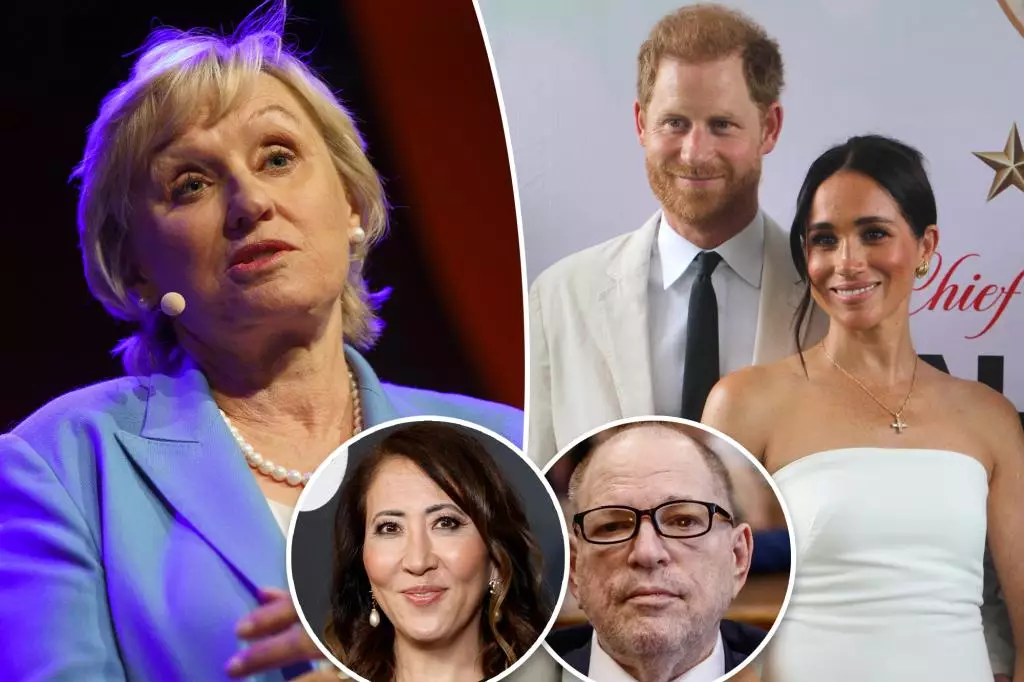Tina Brown, an influential figure in journalism and media, has recently stirred the pot with her candid remarks about Meghan Markle and Prince Harry. In a conversation on the Ankler podcast, Brown elucidates her perspective on the Duke and Duchess of Sussex and their controversial departure from royal duties. While expressing her disdain for Markle’s ideas, she characterizes Prince Harry as a “naïve” individual, ill-equipped to navigate the complexities of his and his wife’s new life in America. The discourse surrounding their choices highlights not only the couple’s personal decisions but also the broader implications of marrying modern celebrity culture with time-honored traditions.
Brown, who has cultivated a reputation for shrewd commentary during her time as the editor of renowned publications, emphasizes Harry’s innate abilities as a royal. She argues that he excels at embodying the role of a prince, suggesting that this skill set has made his subsequent challenges all the more tragic. This notion raises important questions: What happens when the expectations of royal life clash with the demands of celebrity culture?
In her critique, Brown paints Markle as a “perfectionist at getting it all wrong,” illustrating a perception of the Duchess as someone who, despite her determination and ambition, makes poor strategic choices. Brown’s vehement dismissal of Markle’s ideas—”total crap,” as she puts it—posits that the former actress is unable to effectively harness her platform for meaningful impact. This analysis invites further scrutiny into the nature of Markle’s ventures since her split from the royal family.
Indeed, the couple’s initial allure within Hollywood and international entertainment seemed promising, but as Brown aptly points out, their actions may have led to missteps that could ultimately hinder their aspirations. Markle’s potential mishaps, according to Brown, stem from a perceived inability to heed wise counsel. This raises a significant point about the essential balance between making one’s own decisions and remaining receptive to outside perspectives, especially when those decisions might affect not only personal reputation but public perception as well.
When discussing Prince Harry, Brown captures a sense of vulnerability, stating that he is both enchanted and led astray by Markle’s vision. By referring to him as a “lamb to the slaughter,” she evokes the image of a naive figure caught in a complex web of external expectations and personal desires. This dynamic of admiration mixed with a lack of critical engagement poses a notable dilemma for Harry. While admiration for Markle’s entrepreneurship and creativity is understandable, the repercussions of such blind faith—as described by Brown—may prove to be detrimental.
The couple’s marital bond further complicates this picture. Their wedding, an event symbolizing both love and ambition, quickly transformed into an emblem of division and discord within the royal family and beyond. Brown’s commentary suggests that Harry’s identity may be overshadowed by his relationship with Markle, thus impacting how he is perceived by the public. This leads us to ponder whether Harry’s status as a beloved public figure is compromised by his association with Markle’s controversial journey.
Looking towards the future, Brown makes a stark observation regarding Markle’s trajectory, suggesting that she has potentially “run out of road.” This statement delves deep into the reality of celebrity culture, where trends shift rapidly and once-promising careers can falter under scrutiny. The immediate question then becomes: What paths remain for Markle, who has staked so much on her brand and image?
Conversely, Brown maintains a hopeful outlook for Harry, arguing that he can still redeem himself in the eyes of the public. His legacy as “Prince Harry,” the grandson of Queen Elizabeth and son of Diana, remains intact, giving him a unique advantage. This duality illustrates the unpredictable nature of celebrity and royal life, where public perception can change overnight.
Beyond the critique of Meghan and Harry, Brown’s own transparency about her previous partnership with Harvey Weinstein adds another layer to this discussion. By acknowledging her misstep in collaborating with Weinstein during his reign of success, she exemplifies the fact that even seasoned professionals can misjudge partnerships and opportunities. This self-reflection allows for a deeper understanding of the complex world of media and celebrity relations, ultimately reminding the audience that risks in career decisions are universal and can have long-lasting consequences.
As Brown continues to champion journalistic integrity through initiatives like the Truth Tellers summit, her reflections serve as a conduit for a wider understanding of how media, personal decisions, and public scrutiny intersect in high-profile lives. Through her critiques of Harry and Meghan, she encapsulates a narrative that ultimately speaks to the vulnerabilities inherent in both royal and celebrity lifestyles, urging a critical examination of how personal ambitions can clash with public expectations. The Sussexes may yet find a renewed path, but as Brown suggests, it will likely require a thoughtful reassessment of their strategic choices moving forward.
